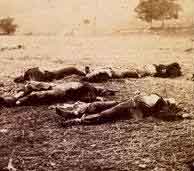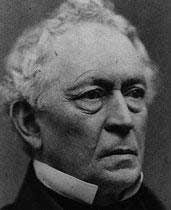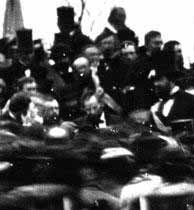Welcome to THE MAKING OF A NATION -- American history in VOA Special English.
In November of 1863, President Abraham Lincoln traveled to Gettysburg, Pennsylvania. He went there to make a speech at a ceremony establishing a military burial ground.
Five months earlier, Confederate General Robert E. Lee had marched his army up from Virginia to invade the North. The Union Army of the Potomac went after him. They met at Gettysburg in the bloodiest battle of the Civil War.
This week in our series, Kay Gallant and Frank Oliver tell the story of Abraham Lincoln's speech -- the Gettysburg Address.
VOICE ONE:
The battle of Gettysburg lasted three days. General Lee threw his men against the Union Army. The northern soldiers refused to break. Lee, at last, had to stop fighting. Badly hurt, his army went back to Virginia.

Lee left behind a battlefield covered with Confederate dead. More than 3,000 Confederate soldiers had been killed. Union losses were almost as heavy. Two thousand five hundreds Union soldiers had been killed.
The terrible job of clearing the battlefield fell to the Union soldiers who had won the battle. Many thousands on both sides had been wounded. The wounded were moved to medical centers for treatment. The dead were buried.
Most of the bodies were buried where they fell. The Confederate dead generally were buried together in large, shallow graves. Union troops who fell were buried in separate graves all over the battlefield.
VOICE TWO:
A few weeks after the battle, the governor of Pennsylvania visited Gettysburg. As he walked over the battlefield, he saw where rains had washed away the earth covering many of the fallen soldiers. He said men who died so bravely should have a better resting place than that.
The governor said a new cemetery should be built for the bodies of the Union soldiers. He asked the governors of other northern states to help raise money for the cemetery.
Within a month, there was money enough to buy a large area of the battlefield for a military cemetery. Work began almost immediately. The human remains were moved from other places on the battlefield and put into graves in the new cemetery.
VOICE ONE:

The governor planned a ceremony in November, 1863, to dedicate the Gettysburg cemetery. He invited governors and congressmen from each state in the Union. He asked a former senator and governor of Massachusetts, Edward Everett, to give the dedication speech.
An invitation was sent to the White House, too. The governor asked President Lincoln to come to the ceremony. He asked Lincoln to say a few words.
Lincoln agreed to do so. He felt it was his duty to go. He wanted to honor the brave men who had died at Gettysburg. Lincoln hoped his words might ease the sorrow over the loss of these men and lift the spirit of the nation.
VOICE TWO:
Lincoln was advised to talk about democracy. He recently had received a letter from a man in Massachusetts. The man had just returned from a visit to Europe.
The man told Lincoln that Europeans saw the war more clearly than Americans, who were in the middle of it. He said they saw it as a war between the people and an aristocracy. The South, he said, was ruled by a small group of aristocrats. He said once the people understood that it was a war for democracy, they would win it quickly.
The man urged Lincoln to explain to the common people that the war was not the North against the South, but democracy against the enemies of democracy.
VOICE ONE:
Lincoln was busy during the two weeks before the ceremony at Gettysburg. He did not have much time to work on his speech. He decided what to say. But he did not choose the exact words he would use.
Lincoln left Washington November 18th for the train ride to Gettysburg. The train stopped in Baltimore. A crowd waited to see him.
An old man came up and shook Lincoln's hand. He told the president that he had lost a son in the fighting at Gettysburg. Lincoln said he understood the man's sorrow.
Lincoln said to the old man: "When I think of the sacrifices of life still to be offered, and the hearts and homes to be made lonely before this terrible war is over, my heart is like lead. I feel at times like hiding in a deep darkness."
VOICE TWO:
Lincoln arrived at Gettysburg at sundown. He had dinner. Then he went to his room to complete the speech he would give the next day. He worked for several hours. Finally, it was done.
The next morning, Lincoln -- on horseback -- led a slow parade to the new cemetery. A huge crowd waited before the place where Lincoln and the other important visitors would sit. Military bands played. Soldiers saluted.
VOICE ONE:
The ceremonies began with a prayer. Then Edward Everett rose to speak.
Everett stood silent for a moment. He looked out across the battlefield and the crowds that now covered it. He began to talk about the Civil War and what had caused it. He spoke about Lee's invasion of the North. He told how northern cities would have fallen had Lee not been stopped at Gettysburg. He praised the men who had given their lives in the great battle.
Everett spoke for almost two hours. He closed his speech with the hope that the nation would come out of the war with greater unity than ever before.
Then Lincoln stood up. He looked out over the valley, then down at the papers in his hand. He began to read:
VOICE THREE:

"Four score and seven years ago, our fathers brought forth on this continent, a new nation, conceived in Liberty, and dedicated to the proposition that all men are created equal.
"Now we are engaged in a great civil war testing whether that nation or any nation so conceived and so dedicated, can long endure. We are met on a great battlefield of that war. We have come to dedicate a portion of that field, as a final resting place for those who here gave their lives that that nation might live. It is altogether fitting and proper that we should do this.
"But, in a larger sense, we cannot dedicate -- we cannot consecrate -- we cannot hallow this ground. The brave men, living and dead, who struggled here, have consecrated it, far above our poor power to add or detract.
"The world will little note, nor long remember what we say here, but it can never forget what they did here. It is for us the living, rather, to be dedicated here to the unfinished work for which they who fought here have thus far so nobly advanced.
It is rather for us to be here dedicated to the great task remaining before us - that from these honored dead we take increased devotion to that cause for which they gave the last full measure of devotion - that we here highly resolve that these dead shall not have died in vain that this nation, under God, shall have a new birth of freedom - and that government of the people, by the people, for the people, shall not perish from the earth."
VOICE TWO:
The crowd applauded for several minutes. Then the people began to leave.
Lincoln turned to a friend. He said he feared his speech had been a failure. He said he should have prepared it more carefully.
Edward Everett did not agree with Lincoln. He said the president's speech was perfect. He said the president had said more in two minutes than he, Everett, had said in two hours.
Newspapers and other publications praised Lincoln's Gettysburg address. Said one: "The few words of the president were from the heart, to the heart. They cannot be read without emotion."
Abraham Lincoln went back to Washington that night. He was very tired. Within a week, his secretary announced that the president was sick. He was suffering from smallpox.
(MUSIC)
ANNOUNCER:
Our program was written by Frank Beardsley. The narrators were Kay Gallant and Frank Oliver. You can find transcripts, MP3s and podcasts of our programs, along with historical images, at voaspecialenglish.com. You can also comment on our programs and read what other people are saying. And you can follow us on Twitter at VOA Learning English. Join us again next week for THE MAKING OF A NATION - an American history series in VOA Special English.
Related stories:
South sees protests in North as an opening
American history series: Lee and his army cross into the North
The South wins a battle, but loses Stonewall Jackson
American history series: at Bull Run, a terrible defeat for the North
American history series: South defends its capital
American history series: the Civil War at sea
Lincoln names a general to defend Washington
American history series: the North loses the first major battle of the war
American history series: the Civil War's first days
(Source: VOA 英语点津编辑)